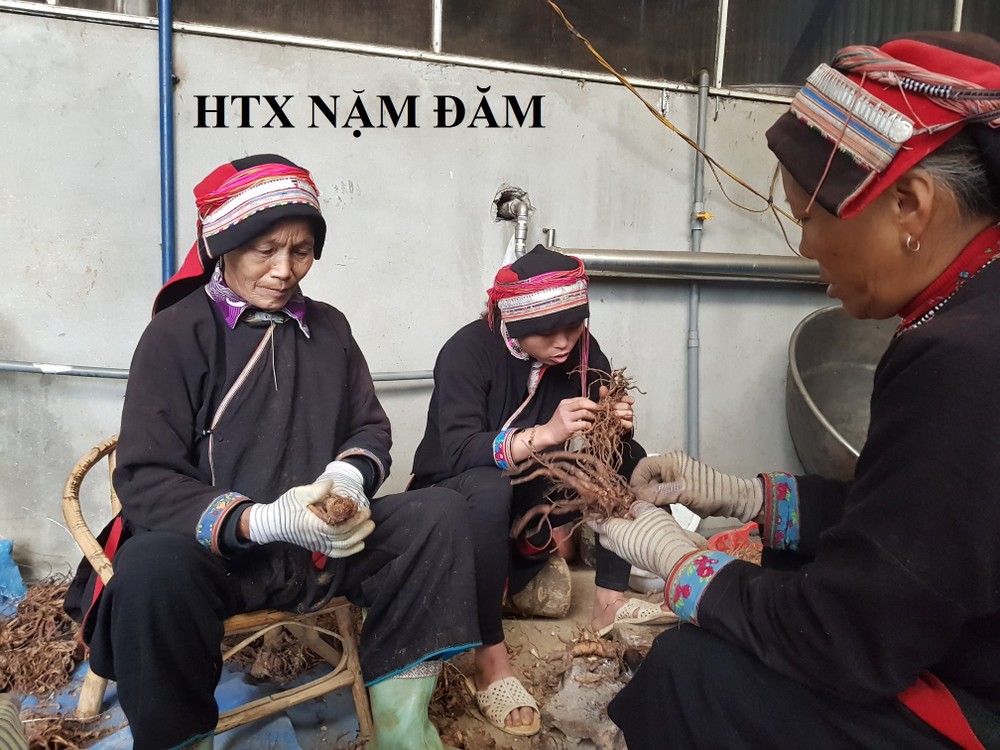
For years, the Dao ethnic minority group in Nam Dam Village are familiar with the medicinal properties of plants growing close to their homes, in the open fields, waste lands and the nearby forests. They have used these herbs for remedies for their families and for sale in a local market.
Gradually, valuable medicinal herbs have gone extinct; therefore, creating awareness among local communities on the urgent need of conservation of medicinal plants.
Gradually, valuable medicinal herbs have gone extinct; therefore, creating awareness among local communities on the urgent need of conservation of medicinal plants.
Ly Ta Den, a Dao ethnic man, has initially collected natural medicinal herbs for processing into products to serve visitors to Dong Van rocky plateau. Later, he found out that many of the herbs have been facing extinction for overexploitation, he was determined to set up a cooperative with the participation of 29 members to grow and process medicinal products, providing services like medicinal herbal baths, saunas, accommodations for tourists and tourism services in 2014.
The establishment of the cooperative aims to conserve rare herbs and help locals to fight against poverty.
In the early time, the co-operative has been bumping in difficulties due to lack of capital and experience in harvesting and processing. Half yearly, most people wanted to withdraw their capital from the co-operative, leaving only seven people involved as the cooperative couldn’t sell its products resulting in dispirited members who took their capital back; therefore, the cooperative’s capital was only around VND200 million (US$8,723).
But, with valuable medicinal herbs sources in nature and his desire to take advantage of the mountains and forests to improve the lives of people in upland areas, Den and the rest of the members were not discouraged but kept the faith.
Den traveled to the Pharmacy University in Hanoi to seek assistance where lecturers gave him training on production procedure of plants. He also linked with pharmaceutical companies for consultation of technologies in processing herbs and consumption of the cooperative’s products. Furthermore, to ensure the supply of medicinal herbs and preserve the precious medicinal herbs, the cooperative worked with the Center for Research and Development of Vietnamese Traditional Medicinal Plants to implement the project 'Preserving genetic resources of precious medicinal plants of the ethnic Dao people'.
The cooperative expanded its nursery area up to 3,000sq.m for species-oriented cultivating and domesticating of rare and endangered medicinal plants in a protected area which is keeping more than 100 species of valuable medicinal herbs such as cucumber, artichoke and honeysuckle, rhubarb root, tuberose and some other plants in traditional remedies of the Dao ethnic people.
The nursery garden can provide enough seeds for the cooperative and local people. Ly Ta Den also encouraged the cooperative’s members to grow medicinal properties of plants in their open fields based on guided techniques and sell them back to the co-operative. After having a stable source of raw materials, the co-operative has invested in building a drying area, a processing factory and a system of machinery for distilling essential herbal extracts. The cooperative also built tobacco baths, a system of preliminary processing and pharmaceutical processing factories on an area of more than 4,000sq.m with a total investment of some VND2 billion (US$86,100).
Ly Ta Den and the cooperative’s members have brought their products to introduce at agriculture and medicine fairs and expos countrywide. In addition to provision of medicinal products made from traditional rare plants, the cooperative has also introduced and displayed its products to tourist destinations.
Moreover, Den has created a QR code for products of the cooperative and signed contracts with enterprises to open store chains to sell herbal medicines in Hanoi and Ho Chi Minh City as well as sell online. Old members of the cooperative who had withdrawn their money asked to join in again when they saw the development of the cooperative, bringing the members up to 25 who have donated their fields to grow medicinal plants.
After nearly six years of operation, the co-operative has created a brand name for the products and business activities are stable. The co-operative has invested in building relatively complete infrastructure systems, increasing revenue from production, preliminary processing of medicinal herbs, and most importantly, the cooperative's products have won the trust from customers. Each year, the co-operative develops from five to 10 hectares to make more than 200 tons of raw materials and sells many products including artichoke glue and ginger tea achieving three stars in the One Commune One Product (OCOP) program.
The cooperative’s present revenue is around VND1.3 billion and profit increases by 20 percent, its members receive a monthly salary of VND3 million – VND4 million a person. The cooperative’s shareholders get dividend at the end of every year. Ly Ta Den’s dream to convert his hometown into a center for preservation of Dao ethnic minority’s medicinal herbs has come true.
More and more tourists have flocked to the village to enjoy medicinal herbs. The living condition of locals has gradually improved thanks to the preservation of medicinal plants and opening of tourism services. Nineteen households in the village are ready to serve over 190 holidaymakers a day.
























